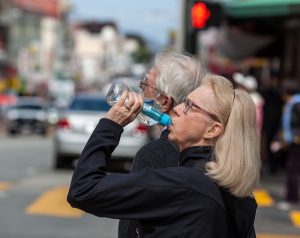Recent news and updates
GERD
Background
Although gastroesophageal reflux disease (GERD) is common among older adults, the true prevalence is not known. Many patients with GERD-related symptoms never discuss their problems with their primary care provider. GERD is thought to occur in 5–7% of the world’s population, with 21 million Americans affected (International Foundations for Functional Gastrointestinal Disorders, 2008). It is found in both men and women.
Signs and symptoms
Pathophysiological changes that occur in the esophagus, hiatal hernia, and certain medications and foods increase the risk for GERD. Obesity (Corely , Kubo, Levin et al., 2007) and activities that increase intra-abdominal pressure such as wearing tight clothes, bending over, or heavy lifting have also been linked to GERD (MedlinePlus, 2005a). The cardinal symptom of GERD is heartburn; however, older adults may not report this, but rather complain of other symptoms such as pulmonary conditions (bronchial asthma, chronic cough, or chronic bronchitis), a hoarse voice, pain when swallowing foods, chronic laryngitis, or non-cardiac chest pain (Pilotto & Franceschi, 2009). The chronic backflow of acid into the esophagus can lead to abnormal cell development (Barrett esophagus) that increases the risk for esophageal cancer.
Diagnosis
Older adults often have atypical symptoms, making the diagnosis of GERD very challenging. As people age, the severity of heartburn can diminish, while the complications, such as erosive esophagitis, become more frequent. Therefore, endoscopy should be considered as one of the initial diagnostic tests in older adults who are suspected of having GERD (Pilotto & Franceschi, 2009). Examination of the esophagus, stomach, and duodenum through a fiber-optic scope (endoscopy) while the person receives conscious sedation, allows the gastroenterologist to visualize the entire area, identify suspicious areas, and obtain biopsies as needed. Helicobacter pylori (H. pylori), a chronic bacterial infection in humans, is a common cause of GERD, affecting about 30% to 40% of the U.S. population. Testing for H. pylori can be done during the endoscopy or by other tests (Ferri, 2011).
Treatments
The objectives of treatment for GERD include: (1) relief of symptoms, (2) healing of esophagitis, (3) prevention of further occurrences, and (4) prevention of complications (Pilotto & Francheschi, 2009). Lifestyle and dietary modifications are important aspects of care. It is widely recommended that persons with GERD should stop smoking, limit or avoid alcohol, and limit chocolate, coffee, and fatty or citrus foods. Medications should be reviewed and offending medications modified, since certain medications decrease the lower esophageal sphincter (LES) tone, allowing acid to backflow into the esophagus. These include anticholinergic drugs, some hormones, calcium channel blockers, and theophylline. Avoidance of food or beverages 3–-4 hours prior to bedtime, weight loss, and elevation of the head of the bed on 6-to-8 inch blocks are some other interventions that may help alleviate symptoms. Pharmacological treatments with antacids in conjunction with histamine 2 (H2) -blockers (Tagmet, Zantac, Axid, and Pepcid) are used for mild GERD. If these are ineffective in controlling symptoms, then the proton pump inhibitors (PPIs) are the next drugs of choice. These include medications like Nexium and Dexilant. With lifestyle modifications and appropriate medications, older adults can manage their GERD symptoms so that quality of life is maintained.
Adapted from Mauk, K. L., Hanson, P., & Hain, D. (2014). Review of the management of common illnesses, diseases, or health conditions. In K. L. Mauk’s (Ed.) Gerontological Nursing: Competencies for Care. Burlington, MA: Jones and Bartlett Publishers. Used with permission.
http://www.mayoclinic.com/health/gerd/DS00967
Seniors and Addiction Rehab: What Do You Need to Know?

There are addiction rehab programs for seniors. Many people don’t consider seniors when they think of someone having an addiction. However, that may be a mistake. There are many seniors who experience chronic pain, grief, and other issues, which is why they may abuse drugs. The schedule will be customized to meet each individual’s addiction recovery needs.
Components of Treatment
It is helpful to know what the components of treatment will be, whether you or a senior in your life, needs to get treatment. Some of these components include the following:
● Group therapy
● Daily assessments
● Pain management
● Medication assessments
● On-site medical detox
● Psychological assessments
● Faith-based counseling
● Relapse prevention tips
● Family therapy
These components may vary depending on the addiction treatment center that is attended. You may also get yoga, physical therapy, exercise, and other treatments.
Symptoms and Signs of Substance Abuse
It can be even more troublesome when an addiction goes unnoticed or doesn’t get treated. This is why it is so essential to recognize the symptoms and signs of substance abuse in seniors. Some of these things include the following:
● Anemia
● Agitation
● Liver function issues
● Anxiety
● Personal cleanliness issues
● Mental ability changes
● Eating habit changes
● Depression
● Increased falls
● Drinking despite consequences
● Weakness
● Fatigue
● Incontinence
● Violence
● Hostility
● Memory lapses
● Irritability
● More confusion than normal
● Losing interest in enjoyable activities
● Not keeping in touch with friends or family members
● Marital issues
● Panic attacks
● Mood swings
● Slurring of speech
If you notice these symptoms and signs in a senior, be sure to try to get them help.
When it comes to seniors and addiction rehab, it is important to know all this information. Addictions can be dangerous for anyone, especially the elderly. Their organs and body systems don’t work as well, so it is much easier to get alcohol poisoning or overdose on drugs. If you are a senior with an addiction, you can get inpatient rehab for elders today.

